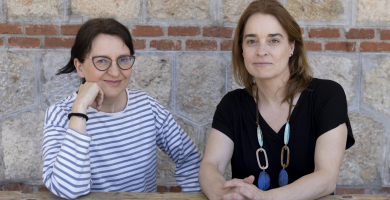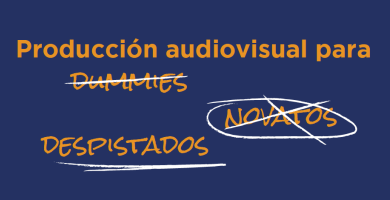
Tiina Lokk-Tramberg: “We have always tried to keep the interests of the films and the filmmakers above our own”.
We interview Tiina Lokk-Tramberg, director and founder of the PÖFF Black Nights Festival in Tallinn, Estonia.

PÖFF was originally a showcase for Nordic films, but as the festival grew it expanded its selection to become the largest film gathering in Northern Europe. The first edition was in 1996, five years after the independence from Russia. What was the filming situation in your country before the independence? Was there enough local production? And what was the idea to begin a festival?
I was the founder of the festival and the director from the same beginning. During the Soviet era, when we were a part of the Soviet Film Industry as all other 14 republics, we had a fully equipped film studio and we produced around 6-8 feature films per year. Our documentary film and animation were well-known even outside the Soviet Union. And we had around 300 screens all over Estonia.
There was an ongoing collapsing process of the film industry and cinemas at the moment we started the festival. Production of Estonian films had been under a question mark and the cinema network was closing down fast. Out of the 300 screens all over Estonia, there were only four screens in two cities that were still operating. And they screened only Hollywood productions. When we started, we wanted people to ask why don’t we have cinemas anymore? Why don’t we have in the repertoire films from other countries besides the US? Where are Estonian films and filmmakers? Black Nights was born as a protest action to prove that there are films - author films and there must be the cinemas and that we have to keep our own film industry and help to develop it.
I think we can say that we as a festival and the industry, in general, have succeeded: Estonia has one of the highest numbers of average cinema visits per capita in Europe - 2,67 (in 2017); we do have a small, but a very successful and well-known film industry and our own film school. Some Estonian films manage to top the local box office and the market share is gradually balancing out, currently holding at 55% for the US, 23% European (Estonia excluded), 8% Estonian production and 13% non-European (in 2017) production.
You are the director of the Festival, but you were related to the filming sector before that. How did you become the director of the festival? And what were your previous experiences in this sector?
I am the founder of the festival and have been directing it since the beginning, having built it up (with a great team, of course) from zero. I finished the Moscow International Film School (VGIK) as a film critic, theorist and, scriptwriter. After having worked in the film studio Tallinnfilm as a script doctor, I was one of the people who participated in building up the film education and the film school (Baltic Film, Media, Arts and Communication School) in Estonia. I also created and ran a distribution company in the 1990s. It went bankrupt during the first economic crisis in 1997 when a lot of cinemas also closed down.
What did it mean to Black Nights Festival the A-list Festival accreditation that you received in 2014 by the International Federation of Film Producers Associations (FIAFP)?
Before getting the A-class statute, we didn’t have the right to put together competitions without any borders, neither geographical nor by topic. We had been a Eurasian festival by the FIAPF classifications. Actually, the initiative to become A class was not our idea - there were filmmakers from South and North America, Africa, who wanted to become part of the competitions, but we couldn’t take them as our regulations didn’t allow it. So now we are free from restrictions.
According to the traditions and also as part of the obligations of an A-class film festival, we have brought out new films and new talents, so the audience gets an exclusive opportunity to see the world and international premiers and we have the responsibility to not become a graveyard for the films with world and international premieres, shown by our festival. That means we have to build up a communication and market department and to develop the Industry part of the festival to help the films travel further.
Also, it is a great opportunity for developing the tourism and service economy sectors, creative industry and also, it’s a big chance for the regional film industry, especially Latvia, Lithuania and Russia and CIS (Commonwealth of Independent States) countries, and of course Estonian Industry most of all.
We are sure there is not a perfect formula for success. However, what do you think are the keys to success for the spectacular growth of your festival?
They are questions not for me, but I think that maybe if we would have always had enough money for making the festival, we wouldn’t have been so creative and hungry to think about how to develop more with less funds. Sometimes, it is good to start from absolutely zero. If I would have known before how difficult it is to create a festival and to run it, I might not have ever done it, but luckily, I always was surrounded by fantastic people and team, who supported and inspired me to go on.
Of course, it never hurts to have great professional skills, but I think so that the most important thing is that we have always tried to keep the interests of the films and the filmmakers above our own. Also, we’ve constantly tried to keep analyzing the landscape and have always known where at a particular moment is our place around the (festival) table - we are dreamers on one hand, realists on the other.
What is the support to the festival by the public administration?
Out of the near 1.4-million-euro budget, the cultural endowment is around 30.000 euros and the city of Tallinn’s support last year was 50.000.
What is the importance of your festival with the distribution sector in your country?
The festival screened 15 films last year that have been distributed, but these are mostly films that have premiered in Berlin, Cannes or Venice. Sadly, the local distributors haven’t yet found the coverage to bring any of the films that we have discovered to the local distribution, although there have been several with good Estonian distribution potential.
How your festival interacts with the local industry: exhibitor, producers, etc.?
Most of the local industry attend our industry events, especially the co-production market; some distributors attend the festival’s industry screenings, but as mentioned before they haven’t made as many deals with these films like the foreign distributors have.
How is your coexistence with other local festivals? Are there more festivals now? And do you think your festival served to create more?
There is not much room for a competitive film event, but only for several small niche festivals, with whom we don’t have very close professionals contacts. We ourselves organize two other off-season events: the Haapsalu Horror and Fantasy Film Festival and Tartu Love Film Festival. The number of film festivals has, more or less, remained the same for the last 10 years.
The Industry@Tallinn and Baltic Event are important parts of your festival. With the Baltic Event and the Works in Progress, you are encouraging the creation of your own cinema. How does this initiative arise? Have you noticed a growth in your own production as a result of the support of your festival?
Baltic Event since 2005 and Industry@Tallinn since 2010 have provided a platform for both, screening the latest near-completed works to the international film community thus making a bigger chance for them to get picked up by sales companies and festivals, and for projects from our region that are in need of a partner outside their home countries. There were only four feature films completed in Estonia in 2010 (7 in 2006), while in 2017 that number was 14, most of them being co-productions that have been in the co-production market line-up.
In an international level, you participate in the European Genre Forum. What is the main goal of this project that has three events and, what is your participation in it?
The European Genre Forum is a three-step series of workshops to help up-and-coming, as well as already established European genre talents with their projects in three following areas: directing (lab organized by Imagine Film Festival in Amsterdam), production (lab organized by Fantastic Zagreb Film Festival) and sales and marketing (Tallinn). The EGF Sales and Marketing Lab in Tallinn usually features extensive pitch training workshops by pitch trainers, special sessions on topics connected to the sales & marketing of projects including how to create an attractive project package, understanding monetization and deals of VOD and digital platforms, expanding the story universe through transmedia and brand engagement, and how to develop festival and market strategy.
You include a line of work with small countries too. Promoters of films from smaller countries like Flanders Region in Belgium were invited last year for example. Do you think is important to join forces with other small regions and how it helps the local production?
Besides the fact the Flanders is a region that has developed a distinct, interesting cinematic language that we wanted to share with our audience, it also shares similarities with Estonia and could serve as an excellent example of a small industry that punches over its weight, with several Academy Awards nominees and has provided several big names for the global industry.
Cooperation as such is always enrichening for a smaller industry, bringing in new ideas, talent, helping to shift the mindset etc. The festival has always held as one of its missions helping to bring forth films from regions that are mostly off the big picture of the film industry, for example, countries like Kyrgyzstan and Armenia that produce great films from time to time.
The festival held the Just Film – Children and Youth Film Festival designed for young audiences, the best films are selected by juries of local youth, and you have a young critics club too. Is that the way to approach the new audiences and create an engagement with them?
Indeed, one vital part of Just Film is getting closer to the younger audiences. That has two important sides to it, strongly interrelated: first of all, to educate and cultivate the youth and generate interest in cinema, to understand the language of film and to search cinematic variety in their viewing experiences, while, of course also cultivating an aftergrowth to the main festival. However, at the same time, it is also an important place to learn their interests and cultural reference points to be used in composing the program.










